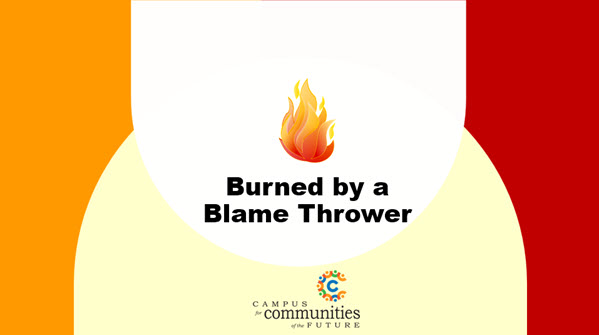Burned by a Blame Thrower

Maybe it’s because I’m a Libra, but my mother always said one of the first sentences out of my mouth as a two-year-old was: ‘It’s not fair.’ Unfortunately, several years ago, that inner two-year-old surfaced, and I found myself not only using that exact phrase but also whining and stomping my feet.
It was a reaction to the pain of being burned by a blame-thrower who attacked my credibility with blatantly untrue comments. It was challenging because those comments were made when I wasn’t present to provide my, not surprisingly, different point of view.
While I suppose we’ve all been there at one point or another, I recall that most of my experience with that blame game took place in high school. Regardless, I suppose it is pretty tempting. Who doesn’t, at some level, want to take credit when things go well and deflect blame when they don’t?
While it may be tempting, blaming others when things don’t go right doesn’t reflect good leadership, nor does it maximize the potential of individuals and organizations. That kind of self-serving behaviour is much more likely to lead to dysfunctional organizations, where a lack of trust will result in far less collaboration, innovation, learning, and, ultimately, success.
Authentic leaders resist the temptation to blame others, assign blame, or take credit for others’ success. They admit mistakes and focus on fixing them and moving forward.
All well and good, but what do you do when you’re embroiled in a situation like mine where you’ve been stabbed by a blame-thrower?
First of all, having a ‘pity party’ is okay. It is unfair and hurts when you’re thrown under the bus. But keep the party brief, lick your wounds, and be ready to move on.
Next, it will be necessary to pause and remove the emotion as best you can to gain some perspective. When you’ve been attacked, it is natural to be hurt and angry and want to fight back, but it is more important to understand what may have prompted the blame.
In my situation, I gained more subjectivity by writing down my version of what had happened. I also checked in with others to gather their feedback about the facts of the matter. The more I stayed in the objective reporter role, the more I realized it wasn’t as much about me as it was about the other person’s situation. It may be that ‘to err is human,’ but when there is a need to deflect fault and blame it on someone else, it is often more about politics. In this case, politics were more about the blame-thrower working within an organization where a culture of fear was predominant, and mistakes were not tolerated, especially by those who wanted to move up within the hierarchy.
Once you’ve gotten over the hurt and gathered more information, the next step must be a strategic response.
After a discussion with a trusted colleague, I realized that fighting back or confronting the woman at this point just wasn’t the answer.
While that was a difficult conclusion for someone like me who strongly believes in open, honest, and authentic communication, I realized I was better off letting the situation play out.
I had to trust that, ultimately, the blame-thrower would crash and burn, as her propensity for deflecting blame and taking credit would reduce her team’s loyalty, motivation, and productivity.
I would also trust those who worked with me to ultimately see that my intentions and heart were in the right place, that I had hard-won knowledge and expertise, and that I did my best to work efficiently and effectively. I had to trust that it was best to take the high road and believe that others would figure it out eventually.
The blame game was painful, and it still hurts a number of years later to think I was unfairly blamed for something untrue. But I also realized I had a choice in responding to the situation. It was more important for me to remove myself from what could have been a harmful and wasteful game of pointing fingers. Instead of the blame game, I focused on a game that incorporated a more positive vision and values for the future within a culture reflecting mutual support, respect, and kindness.
Posted on 08-09-24
Next entry: Bob Rae: Not Retired and Still Going Strong
Previous entry: What Were They Thinking?

 Brenda Herchmer is the owner of Grassroots Enterprises, a community development consulting company.
Brenda Herchmer is the owner of Grassroots Enterprises, a community development consulting company.